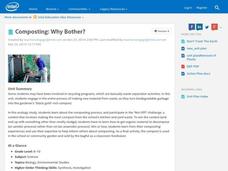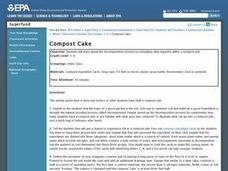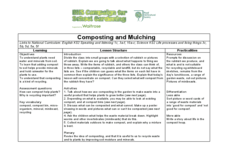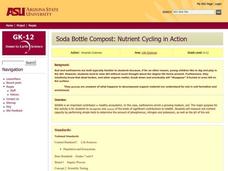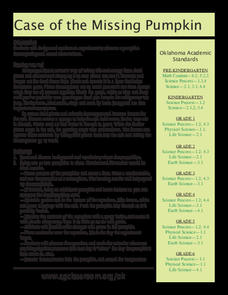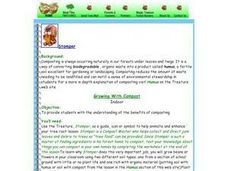Captain Planet Foundation
Rotting Away
What happens at the end of a plant's life cycle? Show kids the natural way that plants show that they're decomposing, as well as the importance of compost, with a lesson about living organisms. After reading Log Cabin by Anne Schreiber,...
SF Environment
Pre-School Composting and Recycling!
You can never be too young to get involved in composting or recycling. Here is a lesson that has been made for the very littlest learners and it's all about the importance of conservation. They'll sort compostable and recyclable objects,...
Intel
Composting: Why Bother?
The first STEM lesson in a group of 10 explores composting. After discussing how to make a better tomorrow, classes are challenged to track garbage in their communities, visit a local waste management facility, and conduct a survey...
Science Matters
Crawly Composters
Get your hands dirty with an interactive instructional activity that showcases the process of decomposing and returning nutrients back into the soil. After building a compost pile, pupils regularly observe the...
Curated OER
Compost Cake
Young scholars examine the decomposition process. They create their own class compost pile and record their observations. They discover which materials decompose at a different rate.
Curated OER
Composting and Mulching
Second graders define composting and recognize what can be composted. In this composting and mulching lesson, 2nd graders classify objects or pictures as good or bad for composting. Students write a story about life in the compost...
California Academy of Science
Composting: A Scientific Investigation: California Academy of Sciences
Garbage, recycle, compost: Does it really matter where we put our trash once we are done? By making detailed observations over seven weeks, kids will see which materials break down naturally to become a healthy part of the soil, and...
SF Environment
Sort and Color!
Sorting is a very important skill that can be used in math and even science. Learners get familiar with some environmentally friendly vocabulary terms as they practice separating objects that can be recycled from those that can't. They...
Curated OER
A Design You’ll Dig: Designing a Habitat for Worms
Students discover how worms contribute to the balance of the environment. In this composting activity, students study the composting and decomposition processes. Students then create habitats for worms that allow them to do their jobs.
Curated OER
Composting
In this recognizing items that can be composted worksheet, students identify organic items that can be composted, write items that can be composted for each of the letters in the word compost, and make a list of vegetables and fruits....
Curated OER
Let's Make a Compost Cake
Students create a compost cake. In this gardening and decomposition science lesson, students review and describe the "nutrient cycle." Students create a compost pile, measure and record the dimensions and temperature of the pile, and...
Curated OER
Recycling by Composting
Young scholars examine the idea of recycling by composting. Using the internet, they research the benefits of composting to the environment. In groups, they collect numbers on how much food and yard waste is produced in their...
Curated OER
Soda Bottle Compost: Nutrient Cycling in Action
Young scholars investigate, through their own experimentation, the important role wildlife play in nutrient cycling. Earthworms and compost are used in this experiment and different experimental setups be evaluated.
Curated OER
To Rot or Not!
Young scholars discover that composting helps reduce landfill waste and is good for the soil. They explore the techniques of composting through a variety of media, art activities and hands-on experience.
Curated OER
Case of the Missing Pumpkin
Scientists define and discuss decomposition, and watch pumpkins decompose and return to soil in classroom experiment. They record the date the experiment began, chart changes in pumpkins on a calendar, count how many days it takes...
Kenan Fellows
Sustainability: Learning for a Lifetime – Soil
Do great gardeners really have green thumbs—or just really great soil? Environmental scholars discover what makes Earth's soil and soil quality so important through research and experimentation. Learners also develop an understanding of...
Cal Recycle
Conserving Natural Resources
Trying to plan an engaging elementary science unit on natural resources? Conserve your energy! This five-part series of lessons and hands-on activities has exactly what you need to teach young scholars about the importance of conservation.
Curated OER
Life In the Soil: Home Sweet Home: Red Worms
In this soil worksheet, students complete 2 pages about the importance of soil in plant growth. Students read about red worms and answer 2 questions about composting. Students fill out a chart with their observations of plants planted in...
Curated OER
Classroom Composting
Students observe and describe the cyclic nature of life. They identify and appreciate the importance of a balanced ecosystem. Finally, students compare and contrast biodegradable and non-biodegradable resources in nature and describe the...
Curated OER
Composting Presentations
Students create an presentation that suggests composting as a possible solution to solid waste issues. They research the types of solid waste that can be composted, the composting process and the role of worms in composting.
Curated OER
Growing With Compost
Students discuss the positives and negatives of composting. They plant their own plant using composting material and record results. They create a poster for the classroom.
Curated OER
Red Wigglers
Students are introduced to the benefits of using Red Wiggler worms to produce compost. They identify the requirements for the worms and the methods to follow in order to produce compost. They draw a picture of a functioning worm bin.
Curated OER
The Trash We Pass
Where does our garbage go? What is the difference between a recyclable and non-recyclable item? Pose these important, but often overlooked, questions to your class and invite them to consider the lasting and damaging effects of the...
Curated OER
Recyclers Revisited
Fifth graders observe their plant experiments that they started in a previous lesson and examine the role of decomposers in the nitrogen cycle. Two weeks after they set up a worm terrarium, they analyze any changes they observe, and...




